News Archives: 2013 - 2015
Graduation Day
14th December 2015
Congratulations to all of iPRD's latest graduates on graduation day. Here are a couple of pictures from the day.

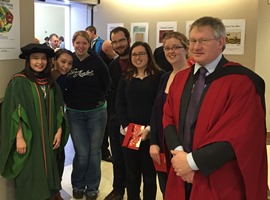
Viva success!
8th December 2015
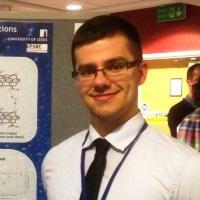 Congratulations to (soon-to-be Dr) Mindaugas Paulaskas on the successful defence of his thesis on 8th December. Paul's PhD research focused on the design and development of a graphene oxide membrane reactor for selective water separations - involving the separation of water from organic solvents. Paul's supervisors were Frans Muller and Charlotte Willans and was sponsored by the EPRSC. As part of his PhD he did an industrial placement at Croda. Paul is off to Germany for his next steps so we wish him all the best in his future endeavors.
Congratulations to (soon-to-be Dr) Mindaugas Paulaskas on the successful defence of his thesis on 8th December. Paul's PhD research focused on the design and development of a graphene oxide membrane reactor for selective water separations - involving the separation of water from organic solvents. Paul's supervisors were Frans Muller and Charlotte Willans and was sponsored by the EPRSC. As part of his PhD he did an industrial placement at Croda. Paul is off to Germany for his next steps so we wish him all the best in his future endeavors.
A huge well done to Paul from all the iPRD.
Upcoming conference
30th November 2015
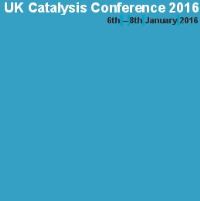 We're looking forward to the UK Catalysis Conference in Loughborough on 6-8th January 2016 where Professor John Blacker of iPRD will be giving a plenary lecture entitled "Why does industry struggle to adopt academics' catalysts?". Academic fellow Dr Thomas Chamberlain and PhD students Rachel Nicholls and Grant Sherbourne also of iPRD will also be giving talks at the conference. To find out more about the conference visit their website.
We're looking forward to the UK Catalysis Conference in Loughborough on 6-8th January 2016 where Professor John Blacker of iPRD will be giving a plenary lecture entitled "Why does industry struggle to adopt academics' catalysts?". Academic fellow Dr Thomas Chamberlain and PhD students Rachel Nicholls and Grant Sherbourne also of iPRD will also be giving talks at the conference. To find out more about the conference visit their website.
Viva success!
30th November 2015
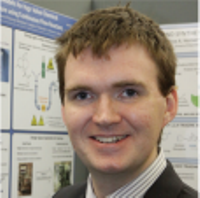 Congratulations to (soon-to-be Dr) Chris Hone for successfully defending his thesis on 26th November 2015. Chris' PhD investigated the evolution of kinetic models using continous flow technologies and was supervised by Frans Muller, Richard Bourne and Steve Marsden. The research was sponsored by AstraZenenca, where he did a few months placement and the EPRSC. Chris will be continuing his research interests in continuous flow in the group of Oliver Kappe at the University of Graz.
Congratulations to (soon-to-be Dr) Chris Hone for successfully defending his thesis on 26th November 2015. Chris' PhD investigated the evolution of kinetic models using continous flow technologies and was supervised by Frans Muller, Richard Bourne and Steve Marsden. The research was sponsored by AstraZenenca, where he did a few months placement and the EPRSC. Chris will be continuing his research interests in continuous flow in the group of Oliver Kappe at the University of Graz.
Well done Chris, all the best for the future from iPRD.
First prize
19th November 2015
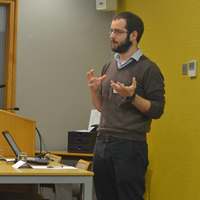 PhD student Nick Holmes was awarded 1st place poster prize at the 5th Conference on Frontiers of Organic Synthesis Technology (FROST) in Budapest, Hungary. The work entitled “Quantitative Mass Spectrometry in Self-Optimizing Flow Reactors for Rapid Process Optimization” was also presented orally on the final day as part of the prize, and was in collaboration with Christian Stanetty and Ian Baxendale from Durham University. Nick is supervised by Richard Bourne and John Blacker and is sponsored by AstraZeneza.
PhD student Nick Holmes was awarded 1st place poster prize at the 5th Conference on Frontiers of Organic Synthesis Technology (FROST) in Budapest, Hungary. The work entitled “Quantitative Mass Spectrometry in Self-Optimizing Flow Reactors for Rapid Process Optimization” was also presented orally on the final day as part of the prize, and was in collaboration with Christian Stanetty and Ian Baxendale from Durham University. Nick is supervised by Richard Bourne and John Blacker and is sponsored by AstraZeneza.
The FROST conference is organized by the flow chemistry society and showcases the latest trends in flow and synthesis technologies. This year's conference featured keynote speakers Rigoberto Advincula (Case Western Reserve Univerisity, Ohio), Holger Löwe (Johannes Gutenberg-University, Mainz) and Walter Leitner (RWTH Aachen) along with other leading researchers from the flow chemistry community.
Well done Nick!
First prize
28th October 2015
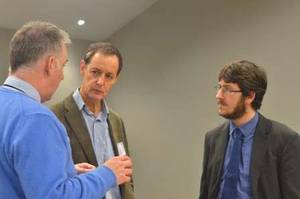 Academic and industrial members of the iPRD industrial club met for the biannual industrial club event at Weetwood Hall. The event consisted of dinner followed by a day of talks and discussions focusing on heterogeneous catalysis. Guest speakers Professor Edman Tsang from Oxford University and Professor David Lennon from the University of Glasgow showcased their research into heterogeneous catalysis and its applications within an industrial setting. A number of iPRD members spoke, including new academic fellows Drs Thomas Chamberlain, Ali Hassanpour and Robert Menzel. The day was rounded off by some of our industrial members who spoke about their companies development and uses of heterogeneous catalysts.
Academic and industrial members of the iPRD industrial club met for the biannual industrial club event at Weetwood Hall. The event consisted of dinner followed by a day of talks and discussions focusing on heterogeneous catalysis. Guest speakers Professor Edman Tsang from Oxford University and Professor David Lennon from the University of Glasgow showcased their research into heterogeneous catalysis and its applications within an industrial setting. A number of iPRD members spoke, including new academic fellows Drs Thomas Chamberlain, Ali Hassanpour and Robert Menzel. The day was rounded off by some of our industrial members who spoke about their companies development and uses of heterogeneous catalysts.
Thanks to all our speakers for a great day!
First prize
16-17th September 2015
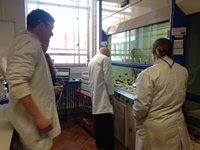 The Dial-a-Molecule Grand Challenge Network has been particularly active in promoting the education and deployment of statistical methods in chemical research. Previous events held under this sub-theme of the Network have indicated that although the tools and techniques are widely used in industry, many academics have never exploited them (often because they were never made aware of them during their own training).
The Dial-a-Molecule Grand Challenge Network has been particularly active in promoting the education and deployment of statistical methods in chemical research. Previous events held under this sub-theme of the Network have indicated that although the tools and techniques are widely used in industry, many academics have never exploited them (often because they were never made aware of them during their own training).
Realising the numerous advantages that training in statistical methods such as Design of Experiments (DoE) and Principle Component Analysis (PCA) would offer, Dial-a-Molecule has the vision that every chemistry graduate should have a grounding in the techniques, and an understanding of when to use them appropriately. To advance this vision, Dial-a-Molecule has awarded financial support to Dr Richard Bourne (iPRD) who has worked with Brian Taylor (AstraZeneca) to enable the development of an UG 'Design of Experiements' laboratory module. A proviso of the funding was that the output (i.e. the lab module) was made available to the chemistry departments across the UK, to incorporate into their own laboratory courses as seen fit.
The practical was first run at the University of Leeds during 2015, where both UG (3rd year) and CDT-masters students had the opportunity to take part. It involved carrying out a simple SNAr reaction using flow methodology, which allowed large amounts of data to be generated quickly. Overall, it was a great success, particularly among the students who provided very positive feedback and enjoyed carrying out industrially relevant experiments. Importantly, the practical allowed them to see the value of DoE.
On September the 16th and 17th, Dial-a-Molecule provided partial support for a workshop to begin to roll out the practical to other departments across the UK. As a pilot 'train-the-trainer' event, two representatives from Cardiff University, The University of Strathclyde, The University of Nottingham and Loughborough University attended the workshop.
Day One began with the participants learning about designing and planning the lab module, and how it had been initially implemented at the University of Leeds. It also gave attendees the chance to provide feedback on the barriers that would preclude its inclusion in other institutions, so that these can be addressed before it is rolled out on a larger scale.
After lunch, the participants split up into two groups and became students again, either donning lab coats to perform the lab practical or returning to the classroom to be given an "Introduction to DoE" tutorial. The roles were reversed on the morning of the second day so that the partcipants had the opportunity to experience both the taught and hands-on elements of the course. The afternoon of day two was devoted to analysing the results from the practical sessions, and getting an overview of how to use the MOdde software package.
The feedback from participants was extremely positive and many could see how the practical could be used, or modified slightly to fit their home institutions teaching program. The course developers are currently preparing a manuscript describing the lab module for publication in The Journal of Chemical Education, and hope to run further workshops like the one described above to enable the practical to be carried out at other institutions.
If you are interested in finding out more about the lab module, or if you want to incorporate it into your own institution, please get in touch. Likewise, as the Dial-a-Molecule Network draws to a close they are seeking sponsership to run future workshops - if you are interested please contact them.
Written by Kelly Kilpin from Dial-a-Molecule.
First prize
15th September 2015
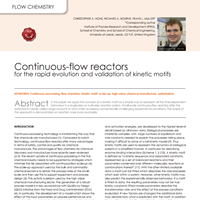 Work by Frans Muller, Richard Bourne and Chris Hone from iPRD on the evolution of kinetic motifs using continuous-flow reactors has been published in Chimica Oggi-Chemistry Today.
Work by Frans Muller, Richard Bourne and Chris Hone from iPRD on the evolution of kinetic motifs using continuous-flow reactors has been published in Chimica Oggi-Chemistry Today.
The paper describes the concept of using small-scale continuous flow reactors to rapidly collect reaction data whilst using reaction conditions that would be challenging in a batch reactor. The ability to generate large amounts of data rapidly, allows the fitting of kinetic motifs to accurately represent the experiemental data and hence, the process development of organic reactions. They explore the differences between statistical and kinetic approaches towards process development and present case studies demonstrating the use of kinetif motifs.
First prize
28th August 2015
 UK based SME, Fiberight Ltd, the Centre for Process Innovation (CPI) and iPRD at the University of Leeds have collaborated as part of an InnovateUK IB Catalyst Late Stage feasibility project. The project will demonstrate optimised enzymatic hydrolysis of Fiberight's high performance cellulose extracted from municipal solid waste, at Demonstration scale, to a repeatable cellulosic sugar which replaces cereal crop for non-food applications.
UK based SME, Fiberight Ltd, the Centre for Process Innovation (CPI) and iPRD at the University of Leeds have collaborated as part of an InnovateUK IB Catalyst Late Stage feasibility project. The project will demonstrate optimised enzymatic hydrolysis of Fiberight's high performance cellulose extracted from municipal solid waste, at Demonstration scale, to a repeatable cellulosic sugar which replaces cereal crop for non-food applications.
The 12 month project, which is being led by Fiberight Ltd, will address the IB challenge of "The supply chain for the commodity sugar" a platform feedstock component for IB. The availability of a novel supply chain feedstock which is outside of the food vs fuel and ILUC debate will mitigate climate impact as well as easing supply chain bottlenecks and dependency on foreign import. MSW derived sugar supports UK-IB by offering security of supply from indigenous resources and a stable price point.
The consortium of 7 partners covers the entire supply and value chain with Fiberight contributing proprietary technology and commercial expertise, in collaboration with CPI, a UK Catapult centre which supports SMEs in the translation of IB into commercial processes. Academics from the University of Leeds, Institute of Process Research and Development (iPRD) will provide process control and monitoring expertise. End user application testing of the cellulosic sugar will be provided by UK Biotech SME Rebio Technologies Ltd, via bioethanol production and Aston University, in the production of levulinic acid using heterogeneous catalysts. Two multinational companies will support the project, Knauf in applications testing for bioresin manufacture and Novozymes for the expertise in, and supply of, industrial enzymes. Success in this project will ensure operational excellence in achieving high sugar yield at scale and will up access to waste feedstocks.
First prize
9th June 2015
 Chemists in iPRD have begun work into the development of bio-based chemicals as part of an extensive three year, £3M project led by Biome Bioplastics. The project aims to use lignin, the waste product from the pulp and paper industry, to produce bio-based chemicals on industrial scale. By increasing the availability of these chemicals the prospect of natural polymers which can compete with oil-based polymers economically and functionally could become reality. The development of bio-based chemical feedstocks could also contribute to a more sustainable chemical industry finding applications in fragrances, coatings and personal care products amongst others.
Chemists in iPRD have begun work into the development of bio-based chemicals as part of an extensive three year, £3M project led by Biome Bioplastics. The project aims to use lignin, the waste product from the pulp and paper industry, to produce bio-based chemicals on industrial scale. By increasing the availability of these chemicals the prospect of natural polymers which can compete with oil-based polymers economically and functionally could become reality. The development of bio-based chemical feedstocks could also contribute to a more sustainable chemical industry finding applications in fragrances, coatings and personal care products amongst others.
iPRD is part of a consortium with the Universities of Warwick and Liverpool and the Centre for Process Innovation (CPI) working with Biome Bioplastics and are involved in developing scale-up processes to produce the bio-based chemicals on a scale that will allow industrial testing. The project has received support from a number of funding bodies including Biotechnology and Biological Sciences Research Council (BBSRC), Innovate UK and Engineering and Physical Sciences Research Council (EPSRC).
More information about the project can be found on Biome Bioplastics website.
First prize
23rd March 2015
 A collaborative team of iPRD chemists and beamline scientists at the European Synchrotron Radiation Facility, led by Dr Bao Nguyen, have reported in J. Am. Chem. Soc. a study using synchrotron-based spectroscopic techniques to study the deactivation of a robust immobilised Cp*Ir catalyst for transfer hydrogenation (developed by Yorkshire Process Technology). In contrast to the common practice of focusing on the metal centre, the team employed a holistic approach to investigate the bonding environment around Ir, Cl and K during catalytic turnover.
A collaborative team of iPRD chemists and beamline scientists at the European Synchrotron Radiation Facility, led by Dr Bao Nguyen, have reported in J. Am. Chem. Soc. a study using synchrotron-based spectroscopic techniques to study the deactivation of a robust immobilised Cp*Ir catalyst for transfer hydrogenation (developed by Yorkshire Process Technology). In contrast to the common practice of focusing on the metal centre, the team employed a holistic approach to investigate the bonding environment around Ir, Cl and K during catalytic turnover.
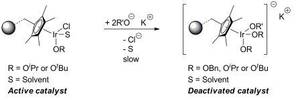 The slow loss of catalytic activity over time was associated with the loss of chloride ligands from the iridium catalyst. In situ monitoring of the catalyst over time led to the discovery of a concurrent increase in potassium content, which happened as the chloride ligand was replaced with alkoxides to generate a less active Cp*Ir-trialkoxide complex.
The slow loss of catalytic activity over time was associated with the loss of chloride ligands from the iridium catalyst. In situ monitoring of the catalyst over time led to the discovery of a concurrent increase in potassium content, which happened as the chloride ligand was replaced with alkoxides to generate a less active Cp*Ir-trialkoxide complex.
Appropriate reactivation strategies have consequently been developed based on these finding to regenerate the catalyst to its original reactivity.
First prize
9th March 2015
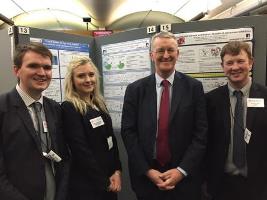 Final year PhD student Christopher Hone from the iPRD was selected to present his work at the SET for Britain event at Westminster. He presented his poster entitled "Process models for high value chemical manufacturing using continuous flow reactors" to expert judges and MPs including Hilary Benn, MP for central Leeds and Shadow Secretary of State for communities and local government who described the participants as "fantastic scientific talent." He is pictured here with all the participants from the School of Chemistry at the University of Leeds.
Final year PhD student Christopher Hone from the iPRD was selected to present his work at the SET for Britain event at Westminster. He presented his poster entitled "Process models for high value chemical manufacturing using continuous flow reactors" to expert judges and MPs including Hilary Benn, MP for central Leeds and Shadow Secretary of State for communities and local government who described the participants as "fantastic scientific talent." He is pictured here with all the participants from the School of Chemistry at the University of Leeds.
The SET for Britain competition is organised by the Parliamentary and Scientific Committee alongside the Royal Academy of Engineering, the Royal Society of Chemistry, the Institute of Physics and the Society of Biology. It is designed to support and promote early-career researchers in the fields of science, technology, engineering and mathematics, many of whom will become some Britain's leading figures in science and technology in the future.
To find out more about the event and SET for Britain check out their website.
First prize
6th March 2015
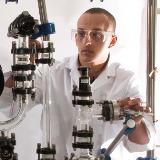 Congratulations to Dr Peter Baldwin on the successful completion of his PhD viva. Peter did his PhD with John Blacker, Xiaojun Lai and Antonia Borissova on crystallisation induced asymmetric transformation of conglometates using racemisation catalysts. He is now working for Johnson Matthey, a British company for speciality chemicals and sustainable technologies.
Congratulations to Dr Peter Baldwin on the successful completion of his PhD viva. Peter did his PhD with John Blacker, Xiaojun Lai and Antonia Borissova on crystallisation induced asymmetric transformation of conglometates using racemisation catalysts. He is now working for Johnson Matthey, a British company for speciality chemicals and sustainable technologies.
A huge well done and best wishes to Pete from all in iPRD.
First prize
12th February 2015
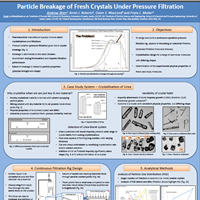 Andrew Shier, a chemical engineering PhD student in iPRD was selected to represent the University of Leeds at the Royal Academy of Engineering's poster competition during their annual regional lecture. Andy's poster, entitled "Particle Breakage of Fresh Crystals Under Pressure Filtration" was chosen to be in the three posters from the University of Leeds and he presented amongst early-career researchers from the universities of Leeds, Liverpool, Manchester and Sheffield. The event was hosted by Liverpool University's School of Engineering and included a lecture by Paul Howarth FREng and Richard Taylor FREng entitled "The future of civil nuclear research in the UK."
Andrew Shier, a chemical engineering PhD student in iPRD was selected to represent the University of Leeds at the Royal Academy of Engineering's poster competition during their annual regional lecture. Andy's poster, entitled "Particle Breakage of Fresh Crystals Under Pressure Filtration" was chosen to be in the three posters from the University of Leeds and he presented amongst early-career researchers from the universities of Leeds, Liverpool, Manchester and Sheffield. The event was hosted by Liverpool University's School of Engineering and included a lecture by Paul Howarth FREng and Richard Taylor FREng entitled "The future of civil nuclear research in the UK."
More about this event and the Royal Academy of Engineering can be found here.
First prize
6th February 2015
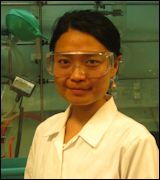 Congratulations to Dr Yuhan Zhao on passing her PhD viva. Yuhan worked with John Blacker on low temperature catalytic hydro-deoxygenation processes of lignin to form aromatic petrochemical monomers.
Congratulations to Dr Yuhan Zhao on passing her PhD viva. Yuhan worked with John Blacker on low temperature catalytic hydro-deoxygenation processes of lignin to form aromatic petrochemical monomers.
A huge well done and best wishes for all her future endeavours go to Yuhan from all the iPRD.
First prize
27th January 2015
 A number of iPRD staff are in Brussels for the kick-off meeting of ProPAT held at the European Commission. Richard Bourne, Frans Muller, Tim Hunter and Ali Hassanpour are part of consortium of industrial and academic members in this significant project which aims to develop novel sensors and analysers for various process parameters including composition, particle size and local bulk properties as well as temperature, flowrate and pressure. They aim to include an integrated process control approach which will assist process development and production in the mineral, ceramic, non-ferrous metals and chemical industries.
A number of iPRD staff are in Brussels for the kick-off meeting of ProPAT held at the European Commission. Richard Bourne, Frans Muller, Tim Hunter and Ali Hassanpour are part of consortium of industrial and academic members in this significant project which aims to develop novel sensors and analysers for various process parameters including composition, particle size and local bulk properties as well as temperature, flowrate and pressure. They aim to include an integrated process control approach which will assist process development and production in the mineral, ceramic, non-ferrous metals and chemical industries.
To find out more about the project check out their website, here.
First prize
13th January 2015
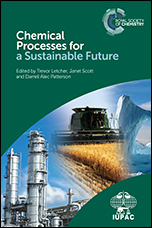 A book chapter written by Richard Bourne and Nick Holmes has just been published in the RSC's book "Chemical Processes for a Sustainable Future." The book examines the main chemical processes and their impact particularly focusing on the reduction of pollution and maintaining existing resources. It demonstrates ways to lower the cost of producing chemicals and new methodologies chemists are adopting to lower the environmental impact of chemical processes.
A book chapter written by Richard Bourne and Nick Holmes has just been published in the RSC's book "Chemical Processes for a Sustainable Future." The book examines the main chemical processes and their impact particularly focusing on the reduction of pollution and maintaining existing resources. It demonstrates ways to lower the cost of producing chemicals and new methodologies chemists are adopting to lower the environmental impact of chemical processes.
More information about the book can be found on the RSC webpage.
First prize
18th December 2014
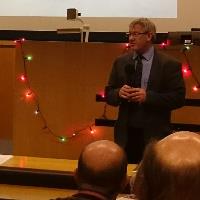 Congratulations to John Blacker who was awarded the SCI Yorkshire and Humber Chemistry for Industry Award. He was presented the award by Joe Sweeney at the University of Huddersfield on 17th December 2014. The award is given to individuals who have used the application of chemistry to enable and support sustainable industrial development in the Yorkshire and Humber region. John's work in the chemical industry and academia have contributed beneficially to several companies in the area. His work in iPRD has enabled at cost support for Yorkshire and Humber SMEs in process research and development and our case studies give some examples of this work.
Congratulations to John Blacker who was awarded the SCI Yorkshire and Humber Chemistry for Industry Award. He was presented the award by Joe Sweeney at the University of Huddersfield on 17th December 2014. The award is given to individuals who have used the application of chemistry to enable and support sustainable industrial development in the Yorkshire and Humber region. John's work in the chemical industry and academia have contributed beneficially to several companies in the area. His work in iPRD has enabled at cost support for Yorkshire and Humber SMEs in process research and development and our case studies give some examples of this work.
The award was followed by a lecture by Dr Paul Elliott called "Illuminating Chemistry: The Molecular Manipulation of Light." This is part of a public lecture series, hosted by the University of Huddersfield and included examples from this years chemistry and physics Nobel Prizes as well as Paul's own research.
To find out more about the award visit the SCI website.
Well done John!
First prize
15th December 2014
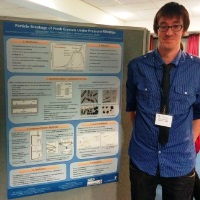 iPRD student Andrew Shier was awarded a poster prize at the Winter Process Chemistry Conference on 11th December for his poster entitled "Particle Breakage of Fresh Crystals Under Pressure Filtration." Andy was one of three iPRD students who were presenting at the conference and his research is funded by the EPRSC and AstraZeneca.
iPRD student Andrew Shier was awarded a poster prize at the Winter Process Chemistry Conference on 11th December for his poster entitled "Particle Breakage of Fresh Crystals Under Pressure Filtration." Andy was one of three iPRD students who were presenting at the conference and his research is funded by the EPRSC and AstraZeneca.
The conference was hosted by Manchester Interdisciplinary Biocentre at Manchester conference centre and included speakers with strong links to industrial process development from both academia and the chemical industry. Presenters included people from chemistry, chemical engineering and biotechnology disciplines. The conference also had a particular focus session on biocatalysis. Further details can be found on the conference website.
First prize
18th November 2014
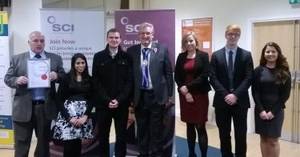 Christopher Hone from the Institute of Process Research and Development was awarded First Place Prize for Combined Oral and Poster Presentation Prize at the SCI Early Career Research Meeting in Chester. Chris received the award for his presentation on “Rate-based Experimental Design using Continuous Flow Reactors”. The research is funded by the EPSRC, University of Leeds and AstraZeneca, and involves developing a new approach for the design of scaled-up continuous flow processes from small scale experiments.
Christopher Hone from the Institute of Process Research and Development was awarded First Place Prize for Combined Oral and Poster Presentation Prize at the SCI Early Career Research Meeting in Chester. Chris received the award for his presentation on “Rate-based Experimental Design using Continuous Flow Reactors”. The research is funded by the EPSRC, University of Leeds and AstraZeneca, and involves developing a new approach for the design of scaled-up continuous flow processes from small scale experiments.
The meeting took place on the 6th of November and showcased work from universities and regional science and engineering companies. The event was co-organised by the SCI Process Engineering Group and the SCI Liverpool and North West Section. Second place prize was awarded to Radhika Bava from the University of Chester. The event concluded with the SCI Henry Armstrong Memorial Lecture from Dr Ian Wilson (University of Cambridge) titled “Soft Solids are Hard Work”.
More information about the event can be found here.
First prize
10th November 2014
 Congratulations to Philip Winkworth on passing his viva with a thesis entitled "Towards the synthesis of imines and iminiums and their reactions in situ".
Congratulations to Philip Winkworth on passing his viva with a thesis entitled "Towards the synthesis of imines and iminiums and their reactions in situ".
Philip is the first PhD student out of the iPRD lab. He worked with supervisors John Blacker and Steve Marsden on the environmentally benign synthesis of functionalised amines via iridium catalysed hydrogen-borrowing. Funding was provided by Astra Zeneca and the EPSRC which gave him the opportunity to spend 3 months during his PhD at AstraZeneca's site in Macclesfield. Philip is now working as an associate for a pharmaceutical consultancy firm.
First prize
29th-30th October 2014
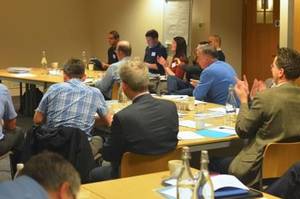 iPRD members joined industry colleagues for the biannual industrial club meeting in Weetwood Hall. A day of diverse talks covering a number of topics from nuclear processing to crystallisation, continuous flow processing to hydrogen transfer catalysis was followed by discussions on EU funding, potential project ideas and the EPSRC Centre for Doctoral Training in Complex Particulate products and a dinner in Weetwood Hall.
iPRD members joined industry colleagues for the biannual industrial club meeting in Weetwood Hall. A day of diverse talks covering a number of topics from nuclear processing to crystallisation, continuous flow processing to hydrogen transfer catalysis was followed by discussions on EU funding, potential project ideas and the EPSRC Centre for Doctoral Training in Complex Particulate products and a dinner in Weetwood Hall.
First prize
October 2014
 Proof of concept funding from the EPSRC Dial-A-Molecule Grand Challenge Network has been awarded to Richard Bourne in collaboration with Nottingham and Bath Universities. They will working on stabilised bimetallic metal nanoparticles in tailor-made carbon nanoreactors as catalysts for continuous-flow biomass vaporisation with supercritical fluids.
Proof of concept funding from the EPSRC Dial-A-Molecule Grand Challenge Network has been awarded to Richard Bourne in collaboration with Nottingham and Bath Universities. They will working on stabilised bimetallic metal nanoparticles in tailor-made carbon nanoreactors as catalysts for continuous-flow biomass vaporisation with supercritical fluids.
First prize
October 2014
![]() Funding for a new project entitled the Evaluation of statistical design for continuous synthesis of pharmaceutical compounds has been given to Richard Bourne in collaboration with AstraZeneca.
Funding for a new project entitled the Evaluation of statistical design for continuous synthesis of pharmaceutical compounds has been given to Richard Bourne in collaboration with AstraZeneca.
First prize
14 July 2014
 Congratulations to iPRD prize winners Nic Webb and Dan Foley for talks and Chris Hone for his poster at the annual School of Chemistry Postgraduate Conference on June 18th and 19th.
Congratulations to iPRD prize winners Nic Webb and Dan Foley for talks and Chris Hone for his poster at the annual School of Chemistry Postgraduate Conference on June 18th and 19th.
The School came together for two days of fantastic talks and poster presentations for our 2nd and 3rd year PhD students. Prof David Smith of the University of York delivered the plenary talk and the event was closed by a wine reception then the PG ball the following evening.
First prize
8 April 2014
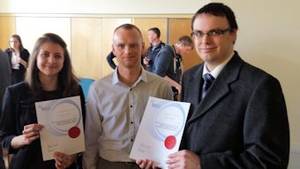 Final year PhD student Nicola Webb won first prize at the SCI regional conference.
Final year PhD student Nicola Webb won first prize at the SCI regional conference.
Organic chemistry students in the final year of their doctoral studies at UK universities (in synthesis, mechanistic studies, methodology, medicinal chemistry or analysis) were invited to submit applications to present their work at this regional half-day symposia.
Nicola who works in Prof Steve Marsden's group said "My abstract was accepted, along with ten other students from northern universities, and we were given twenty minutes to present our research and answer questions from the audience. I presented a talk called 'Vinyl esters as acetylene equivalents: Rhodium(III)-catalysed C-H activation for the synthesis of isoquinolones and isoquinolines'.
Minister for Universities and Science visits iPRD
January 2013
State of the art facilities for chemistry and chemical engineering in the Institute were showcased during recent a visit by the Rt Hon David Willetts MP.
The minister was given a tour of the Institute of Process Research and Development (iPRD), which aims to bridge the gap between academic research and its application in the chemical and pharmaceutical industries.
Mr Willets said "It is great to see a facility such as this one here at Leeds which is bridging that gap and bringing the benefits of fundamental research to the pharmaceutical and chemical industries.”
Further details are available on the University website
CHEM21 - Chemical manufacturing methods for the 21st century pharmaceutical industries
iPRD scientists and engineers joined colleagues from twelve top European universities, six pharmaceutical companies and four small to medium enterprises to form Europe's largest public-private partnership dedicated sustainable manufacturing of pharmaceuticals. The €26.4 (£21.2M) 4-year project, CHEM21, aims to develop sustainable biological and chemical alternatives to finite materials, such as precious metals, which are currently used as catalysts in the manufacture of medicines.
See the project website for more details
